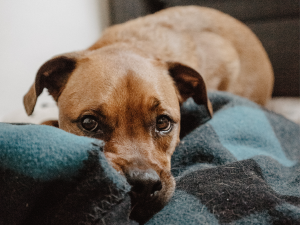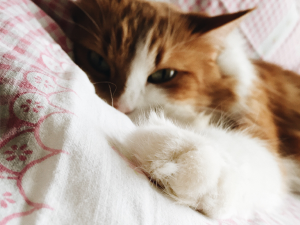If you’ve ever wondered to yourself “do animals grieve?”, scientists have confirmed that they certainly do – or at least, their behaviour changes  enough to mimic what humans perceive to be grief. A 2016 study of 311 cats and dogs conducted in Australia and New Zealand concluded that the animals indeed displayed modified behaviour at the loss of a fellow pet. These behaviours included an increase in vocalisation, an increase in demands for attention, a loss of interest in food, and actions such as seeking out the deceased pet’s favourite spot, all of which could be a result of the grieving process. Outside of these studies, owners have stated that, after losing a pet, their surviving pet’s personality has changed, at least temporarily.
enough to mimic what humans perceive to be grief. A 2016 study of 311 cats and dogs conducted in Australia and New Zealand concluded that the animals indeed displayed modified behaviour at the loss of a fellow pet. These behaviours included an increase in vocalisation, an increase in demands for attention, a loss of interest in food, and actions such as seeking out the deceased pet’s favourite spot, all of which could be a result of the grieving process. Outside of these studies, owners have stated that, after losing a pet, their surviving pet’s personality has changed, at least temporarily.
Just as we wouldn’t ignore a family member who is grieving, we should not ignore our pets if they appear to be distressed as well. Here are some things you can do to help a cat or dog who has recently lost a companion.
Distractions such as a walk or playing with their favourite toy can assist a pet that is withdrawn or disinterested, especially if your cat or dog did these things with their friend. This will help alleviate boredom and anxiety, and reinforce your bond during this difficult time. It may also be a good time to take up obedience or sporting classes together, giving your pet something to focus on other than the loss of their companion.
When a person is suffering from anxiety or depression, the importance of routine is often stressed, as routines promote health and wellness through structure and organisation. The same can be said for your dog or cat, too. Stick to a routine by feeding your pet at the same time, playing with and bathing them just as often as you once did, and retain the structure in your  everyday life to minimise stress on your pet. Just make things feel as “normal” as possible for them.
everyday life to minimise stress on your pet. Just make things feel as “normal” as possible for them.
If your cat or dog is seeking out extra attention during their grieving, be sure to give it to them when they ask – but don’t go out of your way to bother them if they seem to be content lying in the sun where they once used to with their friend. On the other hand, if your pet is exhibiting destructive or negative behaviour (yowling, scratching, using the toilet incorrectly), do not rush to do anything that inadvertently reinforces this behaviour. Just remember that these behaviours will most likely pass with time.
Try to encourage and engage your pet in activities that will fulfil their needs. This can include playdates with other friends (four-legged or otherwise), dishing up their favourite food or treats, or taking an exciting hike or swim at the beach. They may need these extra incentives as part of the grieving process. Exercise caution before running out to adopt a new companion for them, too – both your pet and yourself need to be ready for the next big steps.
Perhaps most importantly, a pet that is going through the grieving process healthily will return to their usual selves in time, going from unwilling to eat to nibbling on their food to eating with the same enthusiasm they once had. If the symptoms of their grief do not seem to get better with time, it may be time to consult a veterinarian, who will be well-versed in what to do for your pet.